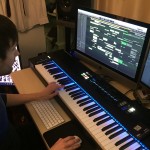We recently had the pleasure of visiting the Square Enix Japan offices where we were able to speak with a number of staff composers as well as some who have since moved on. Aside from seeing the impressive internal sound studio where Square Enix produces all of its music, we had some interesting conversations with the composers, and we’ve selected our time with Mitsuto Suzki to start off our series.
In the interview we touch on everything from Suzuki’s former status as an arranger and synthesizer operator to now a composer with the release of The 3rd Birthday. We get additional details on how he was approached to work on the game as well as the logistics of his solo work released under the Square Enix label and the SQ series.
Hit the jump for our interview.
OSV: We’re happy that you’re doing full scores for Square Enix! Is this something you had wanted all along, or are you more comfortable with sound programming and arrangement?
Suzuki: Thank you. I’m also very happy to be working on scores now. As for your question, I could say yes, I’ve always wanted to compose full scores, but if it came down to simply focusing on composing, I would have to say no.
The reason is that in making a game, I work without really differentiating between composition, arrangement, and programming. Someone in game development with only the ability to compose would be unable to do a lot of the final work integrating the music into the game. Sound design and production, scheduling and budget management, the ability to smoothly work within a team—I feel that I work within a team, but happen to be the member of that team that focuses on sound production.
OSV: Please tell us about your experience working on The 3rd Birthday, your first major game score at Square Enix. How was the composition team arranged in terms of Shimomura-san’s contributions and Sekito-san’s?
Suzuki: Ms. Shimomura contacted me early on in development. In terms of scheduling, it looked a bit rough for her to handle on her own, and just around that time, she heard some of my solo work, liked it, and decided to contact me.
Since the usage of compositions handled by Ms. Shimomura and those we at Square Enix handled were clearly designated, there weren’t any big problems allocating the music, and I was happy each time a new piece came in. All sound data, management, and adjustments were provided on the Square Enix side, everyone got along smoothly, and it was an ideal development team.
As for Sekito-san, development was just wrapping up on THE LAST REMNANT, and I reached out to him while he was still in the swing of things. We discussed and considered everything as a pair for this project, but he came to my rescue with his incredible experience and knowledge on a number of occasions. As a skilled guitarist, composer, and a man that I highly respect, I feel he was a great catch for the team.
OSV: Knowing that Shimomura-san would be involved, were you at all nervous about tackling some of her themes from the original Parasite Eve? How did you approach these arrangements?
Suzuki: Originally Ms. Shimomura was supposed to be in charge of the arrangements, but because the Square Enix side took the lead to keep the schedule, we were really under the gun to be honest. Seriously, it was tough [Laughs].
Since the platform was different from the original and we wanted to improve on the sound quality from Parasite Eve, without losing that, I think we were able to add a breath of something new. Taking all the original data and editing it was, in a way, quite fun and invigorating.
OSV: I have to ask about the arrangement of “Joy to the World.” What can you tell us about that track, the arrangement, and your experience with it?
Suzuki: “Joy to the World” is public domain now. We thought maybe we could arrange it with our Square Enix team. All the in-house composers came with their instruments, and it was a collaboration of the sound team.
OSV: Will you be releasing any more solo projects, or are you sticking solely to game music with your current schedule? What will you be doing for the rest of 2011?
Suzuki: My schedule for 2011 is already full, with the main issue being with how much production time I can squeeze out; I expect that how I proceed from here on out is coming to a major turning point.
My solo projects are for me the same as clothing, food and shelter, so once I build up enough of what I’ve been creating, I release it in a decidedly natural manner. Also, there’s a completely artistic side to it, and this can differ from developing a game with specific themes, but since music is born out of emotions, I just enjoy those emotions each day as I’m making music.
There are also interpersonal relationships and the feedback I receive from the development teams, so I think I’d like to continue my solo and team projects in a balanced fashion.
OSV: For these solo projects, are you working on these at home on the side, or at work as official projects?
Suzuki: Well, half and half. I generally write the music at home, and polish it up here.
OSV: So are these tracks unused music for games, or all original?
Suzuki: All new music.
OSV: Many people are enjoying the “SQ” series (Chill SQ, Love SQ, etc.). Alongside arranging pieces yourself, what is your involvement with this album series? Are you friends/acquaintances/colleagues with the other arrangers?
Suzuki: Just the other day, I made a jingle for a promotional video for the latest release, More SQ. “Suzuki, you got a minute?” “Sure. No prob.” It’s nice to get the chance to work on quick, fun projects like that.
MuZik from Love SQ are all internal staff. Also, a long time ago, I used to work at the same office as note native [laugh]. With the SQ series, the selected musicians are always fresh and surprising, and a lot of artists I personally enjoy are involved; I think it’s a very interesting project.
OSV: Can you give us a preview of what you’ll be talking about at GDC? We’re looking forward to seeing you there, and hope we can talk more about your work there!
Suzuki: My presentation is titled, “PS3 and NDS, the Two Extreme FINAL FANTASY Series.” I plan to talk about the differences in music direction and real time production and the like between the PS3 and Nintendo DS titles I’ve worked on, including Final Fantasy XIII and Four Warriors of Light.
I’m not just planning on speaking, but also giving an impromptu live performance using the software we used in game development. I’ve been rehearsing, though I’m a little unsure about how it’s going to work with all the time live improvisation takes up. If you come out to the conference, I’m sure you’ll have a good time [Laughs]. I’m looking forward to meeting all of you there.
[Special thanks to Emi Uesako at Square Enix Japan for translating the interview]
Tags: Chill SQ, Features, In My Own Backyard, Interviews, Love SQ, Mitsuto Suzuki, More SQ, muZik, Neurovision, Square Enix, Square Enix Composer Series, The 3rd Birthday, Videogame









































[…] in the same scene that repeats several times….sort of… Anyways here’s what Suzuki had to say about this track, “We thought maybe we could arrange it with our Square Enix team. All the in-house composers […]